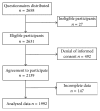The Impact of Sleep Timing, Sleep Duration, and Sleep Quality on Depressive Symptoms and Suicidal Ideation amongst Japanese Freshmen: The EQUSITE Study
- PMID: 27042358
- PMCID: PMC4794596
- DOI: 10.1155/2016/8737654
The Impact of Sleep Timing, Sleep Duration, and Sleep Quality on Depressive Symptoms and Suicidal Ideation amongst Japanese Freshmen: The EQUSITE Study
Abstract
Aim. The aim of this study was to identify the impact of bedtime, wake time, sleep duration, sleep-onset latency, and sleep quality on depressive symptoms and suicidal ideation amongst Japanese freshmen. Methods. This cross-sectional data was derived from the baseline survey of the Enhancement of Q-University Students Intelligence (EQUSITE) study conducted from May to June, 2010. A total of 2,631 participants were recruited and completed the following self-reported questionnaires: the Pittsburgh Sleep Quality Index (PSQI), the Center for Epidemiologic Studies Depression Scale (CES-D), and the original Health Support Questionnaires developed by the EQUSITE study research team. Results. Of 1,992 participants eligible for analysis, 25.5% (n = 507) reported depressive symptoms (CES-D total score ≥ 16), and 5.8% (n = 115) reported suicidal ideation. The present study showed that late bedtime (later than 01:30), sleep-onset latency (≥30 minutes), and poor sleep quality showed a marginally significant association with depressive symptoms. Poor sleep quality was seen to predict suicidal ideation even after adjusting for depressive symptoms. Conclusion. The current study has important implications for the role of bedtime in the prevention of depressive symptoms. Improving sleep quality may prevent the development of depressive symptoms and reduce the likelihood of suicidal ideation.
Figures
References
-
- World Health Organization. Depression. Fact Sheet. 2012;(369) http://www.who.int/mediacentre/factsheets/fs369/en/index.html.
-
- Hysenbegasi A., Hass S. L., Rowland C. R. The impact of depression on the academic productivity of university students. Journal of Mental Health Policy and Economics. 2005;8(3):145–151. - PubMed
LinkOut - more resources
Full Text Sources
Other Literature Sources



